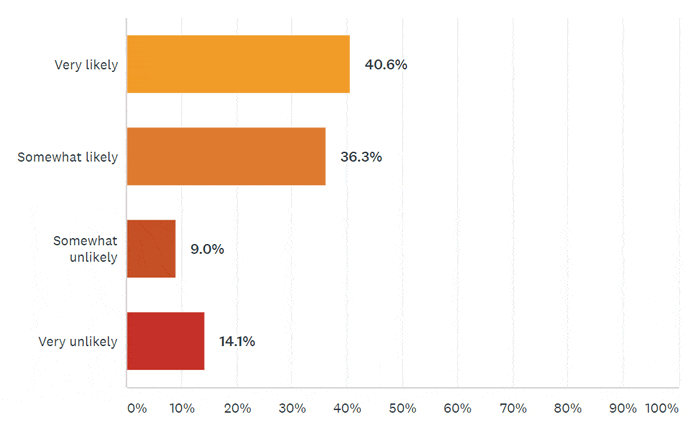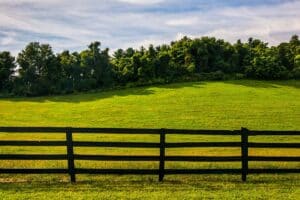Last month, the LANDTHINK Pulse posed the following question to our audience: When the stock market becomes volatile, how likely are you to invest in land?
Our informal online survey revealed that 40.6% of respondents are VERY LIKELY to invest in land amid stock market uncertainty. The stock market has responded to the COVID-19 pandemic with worrying volatility. As fears around the coronavirus spread across the global economy, investors are looking for the calm in the coronavirus storm and are moving out of stocks and into safe haven assets like land.
May Pulse Sponsored by
Many people’s hard-earned investment portfolios have already taken a beating. Stock markets around the world suffered historic losses in the first three months of the year; the S&P 500 lost 20% during the quarter, its worst since 2008. The Dow Jones Industrial Average saw its biggest quarterly drop since 1987, plunging 23%. The global turmoil has investors seeking out safer, non-traditional ways to diversify their portfolio.
For those who prefer a more stable, consistently rewarding avenue of investment, land real estate could be the answer. There are good reasons you should consider it in your portfolio:
Limited Supply and Increasing Demand
There is a finite amount of available land making it a very attractive commodity in a world where the population continues to increase exponentially. If you choose to invest in a growing area, land will become even more scarce and therefore, more valuable. Remember that smart investors invest for the long haul. Land is not liquid. Investing in land can tie up your liquid assets until you’re able to sell the property, but if you’re in the market for a solid, long-term investment, it’s worth the consideration.
Hedge Against Inflation
Typically hard assets are an excellent hedge against inflation, meaning their value rises as the general price levels for goods and services increases (known as Consumer Price Index or CPI). Other investments, especially bonds and similar fixed-income debt instruments, typically lose value as CPI increases.
Affordable and Low Maintenance
Land prices vary based on a variety of factors like location, features, natural resources and more, but it can be purchased at a great price if you come across a motivated seller. Aside from paying property taxes and keeping the land mowed or secured, there’s little to no maintenance required.
Relatively Low Risk
Land has a low correlation to stocks and bonds; buying land for sale is a good way for investors to hedge their portfolio. Hard assets like timberland and farmland are a good hedge against both inflation and economic downturns. They can provide a continuous cash flow from leases and timber income, as well as tax benefits.
Peace of Mind
Land provides safety and security in uncertain times. Coronavirus changed the world in unprecedented ways. High infection rates in cities and urban centers prompted people to rethink where they want to live. People were unexpectedly confronted with issues such as shelter in place orders, social distancing, and the security and availability of food. Then, just as the shelter in place orders were lifted and life was beginning to return to normal, angry and violent protests, looting and vandalism broke out, triggered by the death of George Floyd. Jonathan Goode, with Southeastern Land Group, made the case for buying rural land in Land is a Safe Investment. Owning acreage is a great way to put a buffer between you and the madness caused by pandemics, economic uncertainty and civil unrest. Having a defensible space, where you can live comfortably and self-sufficiently is a growing interest.
Source of Income
There are ways for investors to offset the costs of land acquisition. For landowners, the possibilities are almost endless for how they can turn their land assets into cash revenue. Depending on the characteristics of the property that is purchased, hunting leases, harvesting timberland or leasing agricultural land can all bring in some degree of income.
There are many types of land investors, as well as many types of land buying opportunities. As with any investment, there are advantages and disadvantages associated with purchasing property for investment, as well as risk. Buying land is a complex transaction with many considerations to mull over before closing the deal. Anyone considering a land investment should seek the guidance of licensed real estate agents, attorneys and tax accountants specializing in land sales. These professionals can help investors ensure the likelihood their end goal is met.

The LANDTHINK audience certainly had a strong opinion about investing in land during bouts of market volatility. An overwhelming (40.6%) indicated that they were VERY LIKELY to invest in land, followed closely by 36.3% who said they were SOMEWHAT LIKELY to put their money in the land market. Only 14.1% of our audience said they were VERY UNLIKELY to invest in land when the ups and downs of stock markets leave them stressed and wondering and only 9.0% said they were SOMEWHAT UNLIKELY to enter the land investing market.
LANDTHINK would like to thank PotlatchDeltic for sponsoring the May Pulse and for coming up with a very interesting question to pose to our audience. PotlatchDeltic is a leading Real Estate Investment Trust (REIT) that owns nearly 1.9 million acres of timberland in Alabama, Arkansas, Idaho, Minnesota, Louisiana and Mississippi. PotlatchDeltic, a leader in sustainable forest practices, is committed to providing superior returns to stockholders through long-term stewardship of its forest resources. The company also conducts a land sales and development business and operates wood products manufacturing facilities through its taxable REIT subsidiary.
Become a Pulse sponsor! It’s a great way to ensure your brokerage is the first one buyers and sellers call when they have a need to buy or sell property. You’ll get insane exposure on Social + Email + Web. That’s 500,000+ monthly eyes on you! Once you have it, you won’t want to give it up! Pulse sponsorships are offered on a first come first serve basis and are subject to certain limitations. If your business would be interested in sponsoring a Pulse question, please contact us soon.
Do you have a suggestion for next month’s Pulse question? Submit your question and we might choose yours!
We want to know what you think about our June Pulse question, chosen and sponsored by Mossy Oak Properties: How might an election year influence your motivation to buy or sell land? Answer now.
This content may not be used or reproduced in any manner whatsoever, in part or in whole, without written permission of LANDTHINK. Use of this content without permission is a violation of federal copyright law. The articles, posts, comments, opinions and information provided by LANDTHINK are for informational and research purposes only and DOES NOT substitute or coincide with the advice of an attorney, accountant, real estate broker or any other licensed real estate professional. LANDTHINK strongly advises visitors and readers to seek their own professional guidance and advice related to buying, investing in or selling real estate.











These are some excellent tips and/or reasons that land is always a good long term investment